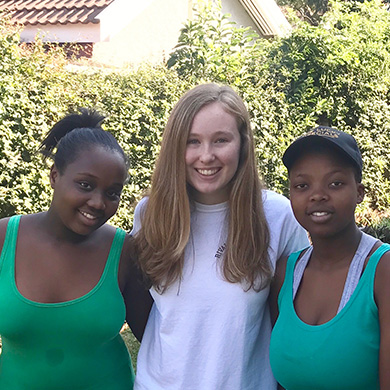

The Ten Commandments, at the time they were received, made the people of Israel distinct. Whereas some of the gods of other religions at the time were pleased through the sacrifice of animals and sometimes even children, this God—the God of the people of Israel—was pleased simply by seeing her people treating each other with love and kindness.
In eighth grade, I was confirmed here at Brown. Growing up a pastor’s kid has had its share of ups and downs—it makes you distinct in all the wrong ways. At that time, all I was sure of was that Brown Memorial was a place where I could be myself, where I could be vulnerable and be different, and be valued for it. I felt Brown was a place where God’s message to “love your neighbor” was embodied, or at least attempted, and I wanted to be a part of it.
But it was also around this time that I began to realize that Brown, like the people of Israel, was distinct from many other churches and many other communities. God’s message of loving our neighbors is not always embraced by those around us, like it is here at Brown.
Last year, I had the opportunity to travel to South Africa for a month. For that month, I lived in a house with seven other people, among them several girls from the township of Umkhumbane. They were all around my age, and the five of us girls would often run around the park nearby, take trips to the grocery store, or simply talk about our lives. Over that month, we all came to be good friends.
I remember one day in particular, when the only people at the house were the five of us girls. A real estate agent and her client had come by the house we were living in; the family I was staying with was anticipating moving back to the United States sometime soon, and was preparing to possibly put their house on the market. The five of us showed the two of them around a little and told them they were welcome to spend as much time as they needed. Clearly talking loud enough for us to hear, the real estate agent told her client that she was sorry to see so many “ugly black girls” and that they would only need to talk to the “one pretty white girl.”
She asked me a lot of questions about the house, and I told her that my friends would probably be able to answer them better, as I was an exchange student and didn’t live there. “Oh, so they really live here?” was her reply, shaking her head. It was then we told her that they really needed to leave. Later, in relaying the story to others, we laughed, joking about how a racist lady had come by the house that afternoon. But still, the message hit home. Years after apartheid, years after laws state that all are to be treated equally, many still don’t embody or even embrace that message.
What made God’s Ten Commandments so special was how first and foremost they tell us to treat our neighbors with love and kindness. The book, “Small Beauties,” is also about the ways in which we treat our neighbors, in particular the ways in which we sometimes are too quick to judge rather than to take time to listen. No one understood Darcy and her small beauties, instead shutting her down. The family is kicked out of their house for not having the money to pay the rent, something that, while perfectly legal under the laws of the land, is unjust under the law of God. In South Africa, the hold of racism still continues years after apartheid, something far from God’s law of love and kindness. And in our country today the terrorizing of immigrants like Darcy is legal under the law of the land, but a violation of the laws of God.
God’s message, while on first glance something so simple and easy to follow, is so often broken in our daily lives. What if the agents of the crown had asked Darcy’s family first how they could help. What if the real estate agent in South Africa had given the girls a chance to talk, to get to know them. What if in our own country we embraced the immigrants who risk their lives to feed their families instead of treating them like that real estate agent treated my friends? In our own lives, what if we tried to listen more than we spoke. How would things change? Would God’s message of love grow, beginning with little actions, just as it did from Darcy’s small beauties?
I’m not sure I’ll ever really like the distinctiveness that comes with being a pastor’s kid. But I do think I’ve embraced the message that comes with God’s law—love your neighbor. I think the world would be a lot better place if more people embraced it, too.